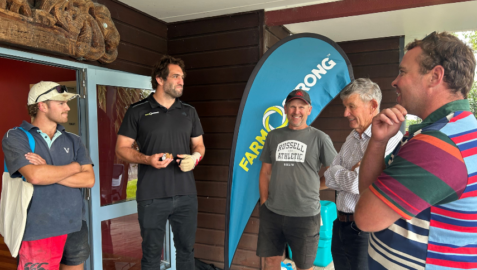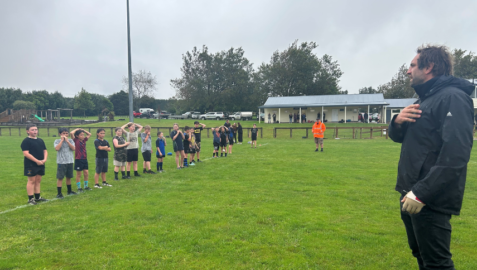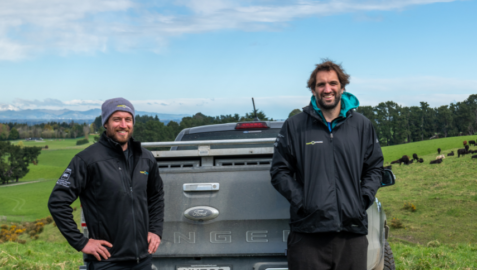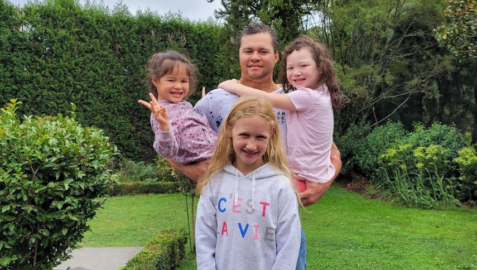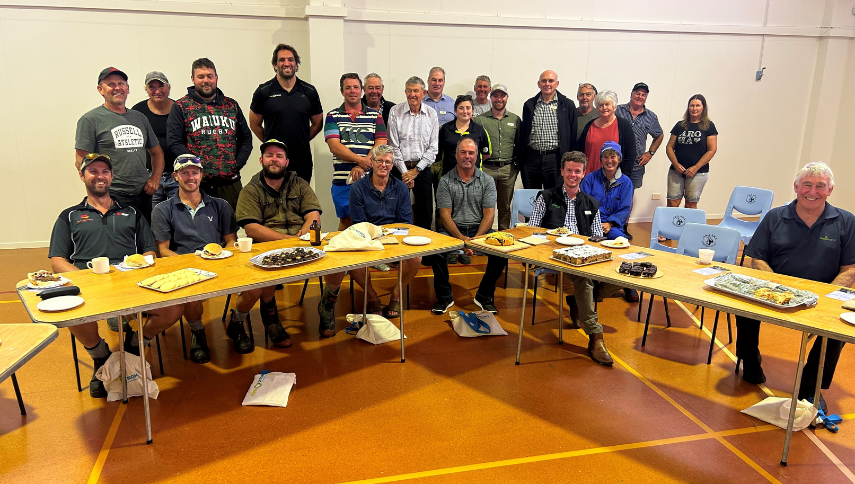
The grass always grows back
Module Overview
Farmstrong ambassador Sam Whitelock has just paid a visit to flood-hit farmers and growers in the Counties and northern Waikato areas to check how they were going. Here’s how it all went down.
First stop was the Aka Aka community hall where locals took a morning off clean-up duties and farm work to have a catch-up and hear how Sam has managed setbacks not only in his sporting career, but also during the Christchurch earthquakes.
The locals fired all sorts of questions his way about what it takes to stay mentally and physically well in the face of a significant challenge. It’s a topic that’s top of mind for many in the light of flood damage to the low-lying area, says local dairy farmer Jo Sands.
“It’s been challenging. We’ve done it quite hard here. The first flood in January, we got 198mls of rain in one night and then more after that. The water couldn’t get away and we had flooding all over the farm. All the drains were overflowing. The water hung round for three or four days so the grass died off and then the cows didn’t want to eat the grass. We also had a lot of lame cows from having wet feet all the time. Then came the cyclone and then more flooding. I think we’ve only had five to seven fine days all summer, so we haven’t really had summer. We’re still waiting for it,” she laughs. “It just feels as if you’re fighting with the elements all the time.”
It’s a similar story further south in Onewhero where farmers gathered at the local rugby club rooms to meet Sam. Kate Reese, a sheep and beef farmer in Wairamarama in north Waikato, describes the impact of the floods there.
“Our community has had a tough time. The initial downpour and then Cyclone Gabrielle really affected us. We even lost a member of our community which was terrible. A lot of our dairy farmers were impacted by overflow from the Waikato river and most of their farms ended up under water.”
Kate says increased communication and connection is something her community had been working on for several years and that work is now paying off. “I think the thing to remember mentally is that the grass always grows back. As long as your stock are contained and everyone is safe, you can put up temporary fencing and the grass will grow back. There will be a light at the end of the tunnel. So, make sure you get off farm and talk with other farmers so you realise everyone’s in the same boat and keep trying to do your extra-curricular stuff, like kids’ sport, to try and keep things normal as much as possible.”
Connecting with others
Sam talked about his experience of the Canterbury earthquakes and the insights it gave him on getting through a lengthy recovery process. He particularly stressed the importance of people looking after themselves after the initial adrenalin rush of dealing with a crisis subsides.
“I remember after the earthquake, for the first couple of weeks, a lot of people got through purely on adrenalin but then, bang, the pressure of it all suddenly just hit them and they fell flat. The thing I noticed is that the people who took the time to connect with others and reset physically and mentally often came out better than the people who just kept on going and going. Obviously cyclones, floods and earthquakes are completely different things, but it’s still about getting through something exceptional.”
Sam intends to return to farming after his rugby career and also shared how his own farm in the Hawkes Bay has been affected by the cyclones with damaged land and fencing. He was quick to point out the importance of sticking together as a community during a crisis.
“I’ve heard from the manager on our place that since the cyclones, they’ve actually met all the neighbours now and the community feels tighter than what it was before. Ideally, that would happen before one of these events, but we all lead busy lives and we’re all time poor, so that’s why I appreciate people coming along today. I know it’s not easy to get off farm, but it’s great that you are here. It’s an important part of getting through something like this.”
Sam also stressed the importance of people pacing themselves for the long haul. “I know a disaster like this affects some more than others. It could take years for some people to get up and running again, just like it was for us in Christchurch. The important thing is to pace yourself, so you don’t burn out. When the earthquake happened, as a team we all went round to a team mate’s place which had been badly hit by liquefaction. It took us five wheelbarrows and two days just to clean his back yard! That was the case for thousands and thousands of others too.”
“You soon learnt, it was about taking things day by day. As anyone in farming knows, there’s always a to-do list that never gets completed. So it’s a case of being realistic about how much you’re trying to do. Decide what’s the most important thing and just focus on that. That was my experience of the quakes.”
Important to look after yourself
Sam also advised locals not to neglect the ‘basics’ such as sleep, nutrition and scheduling downtime. “As well as looking after your neighbours, it’s important to look after yourself – make sure you keep talking to others and take time to stop and reset mentally so you’re not burning out. If you’re working hard, even a ten minute break gives you a chance to ‘get outside your brain’. You can’t just live on adrenalin the whole time. That’s something I learnt during the earthquakes. You can’t get by on adrenalin and no sleep.”
Kate Reese agrees. “It’s important for people to remember they’re not invincible and that everyone has a limit to their energy. As Sam said, people’s natural reaction is to get in there and fix the problem and find solutions because that’s what farmers do, but long term that can have a real impact on families and relationships when people get tired. It’s about having those conversations within families to make sure people aren’t burning themselves out.”
Jo Sands liked what she heard as well. “It was brilliant. It makes you stop and think about what it does take to get through something like this. It was good because Sam’s obviously been through something similar. It will be a big help for anyone who’s young or new to it all. It gives you perspective.”
“I think it’s great that Farmstrong has an ambassador like Sam who’s aware of what’s happened to us and gives his input. It’s great to get his take on what’s going on and how to get through something like this.”
Dairy farmer David McDonald says about a third of his farm ended up under water. “It wasn’t ideal, but you carry on, don’t you? I thought Sam was really good today. I liked the parallels he made between rugby and farming. He’s right. Work on one thing at a time. If you can do one clean-up job a day as well as milking the cows, you’ll get there.”
As if to illustrate that life must go on no matter what the elements throw at us, Sam finished his visit by running a surprise coaching session for the local kids at the Onewhero rugby club. He took time to run them through tackling and passing drills as well as posing for selfies and signing autographs. And yes, it was raining.
